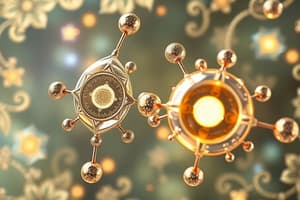Podcast
Questions and Answers
What is the highest temperature a liquid can sustain?
What is the highest temperature a liquid can sustain?
- 100°C (correct)
- 250°C
- 200°C
- 50°C
What is the term for the amount of heat or energy water can absorb before the hydrogen bonds break?
What is the term for the amount of heat or energy water can absorb before the hydrogen bonds break?
- Latent heat vaporization
- High specific heat capacity (correct)
- High boiling point
- Solvent
What is the term for a substance that is attracted to water?
What is the term for a substance that is attracted to water?
- Latent heat vaporization
- Solvent
- Hydrophobic
- Hydrophilic (correct)
What is the term for a substance that repels water?
What is the term for a substance that repels water?
What is an example of a hydrophilic substance?
What is an example of a hydrophilic substance?
What type of bond is present in a water molecule?
What type of bond is present in a water molecule?
What is the primary function of cohesion in plants?
What is the primary function of cohesion in plants?
What is the result of adhesion between water and other polar molecules in plants?
What is the result of adhesion between water and other polar molecules in plants?
What is the primary reason for water's high boiling point?
What is the primary reason for water's high boiling point?
What occurs when a molecule of water evaporates?
What occurs when a molecule of water evaporates?
What is the primary function of latent heat of vaporization in water?
What is the primary function of latent heat of vaporization in water?
Flashcards are hidden until you start studying
Study Notes
Bonding in Water Molecules
- Covalent bonds are present in the water molecule.
Hydrogen Bonding
- Hydrogen bonds are weak molecular forces that form between a positive hydrogen atom and a negative oxygen atom.
- They are responsible for the cohesion and adhesion properties of water.
Labelling a Hydrogen Bond
- A diagram of a hydrogen bond would show a positive hydrogen atom bonded to a negative oxygen atom, with a dashed line representing the weak molecular force.
Properties of Water
- Cohesion: the bonding of two molecules of the same type, e.g., water molecules in a plant, allowing water to be transported from the roots to the top through hydrogen bonds.
- Adhesion: the formation of hydrogen bonds between water and other polar molecules, causing water to stick to them, e.g., water evaporating from xylem vessels in plants and condensing on walls.
- Latent heat of vaporization: the heat required for a molecule to evaporate and become vapor, e.g., the energy needed to boil water.
- High boiling point: the highest temperature a liquid can sustain, e.g., water boils at 100°C.
- High specific heat capacity: the amount of heat or energy water can absorb before the hydrogen bonds break, e.g., water's ability to maintain a cool temperature despite being heated.
Hydrophilic and Hydrophobic Substances
- Hydrophilic: a substance that is attracted to water, e.g., sugar, which absorbs water well.
- Hydrophobic: a substance that repels water, e.g., oils, which cannot mix with water.
Studying That Suits You
Use AI to generate personalized quizzes and flashcards to suit your learning preferences.




